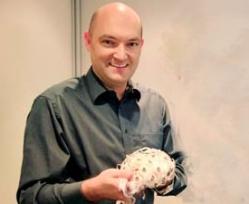Speaker: Prof Markus Ullsperger
Title: How performance monitoring signals may optimise or bias our behaviour
Date: Friday 10 March, 1-2 pm
Venue: AS4/02-08 (Psychology Department Meeting Room)
Abstract:
In my presentation I will discuss mutual interactions of performance monitoring, learning and decision making. After a general introduction of EEG and fMRI correlates of prediction errors, their weighting, and resulting adaptation signals, I will discuss two model-based fMRI studies in which participants make choices that deviate from optimal behavior.
In the first study we used a task that allowed orthogonalizing immediate reward and informational value of action outcomes such that immediate rewards could lower long-term expected value and vice versa. Participants showed suboptimal belief updating compared to an ideal Bayesian learner which, using computational modeling, can be attributed to the influence of model-free reinforcement learning mechanisms. Dissociable brain regions facilitate both types of learning. The model-free, short-term learning is associated with ventral striatal activity, and model-based, long-term learning engages dorsal striatum and frontopolar cortex. Yet, stronger representation of short-term learning by dorsal striatum and frontopolar cortex correlated with optimal long-term belief formation across participants. This suggests that reflection about short-term rewards determines long-term learning success and failure.
In a second value learning study, we found that, when suddenly switched to novel choice contexts, subjects’ choices were incongruent with values learnt by standard learning algorithms. Instead, behavior was compatible with the decisions of an agent learning how good an option was relative to an option with which it had previously been paired. Striatal activity exhibited the characteristics of a prediction error used to update such relative option values.
Trained as a physician, Markus Ullsperger obtained his doctoral degree at the Max Planck Institute of Cognitive Neuroscience in Leipzig, Germany, in 2000. Thereafter he worked as a scientific staff member at the Max Planck Institute for Human Cognitive and Brain Sciences in Leipzig at Yves von Cramon’s Department of Cognitive Neurology. After his habilitation, Markus Ullsperger moved to Cologne, where he headed the Max Planck Research Group Cognitive Neurology at the Max Planck Institute for Neurological Research. In 2009 he was appointed as full professor of Biological Psychology at the Radboud University Nijmegen, Netherlands, and principal investigator at the Donders Institute for Brain, Cognition, and Behaviour. Since 2012, he has been full professor of Neuropsychology at the Otto von Guericke University Magdeburg, Germany. Currently he spends three months as a visiting professor in the Neuroscience & Behavioural Disorders Programme at Duke-NUS Graduate Medical School in Singapore.


